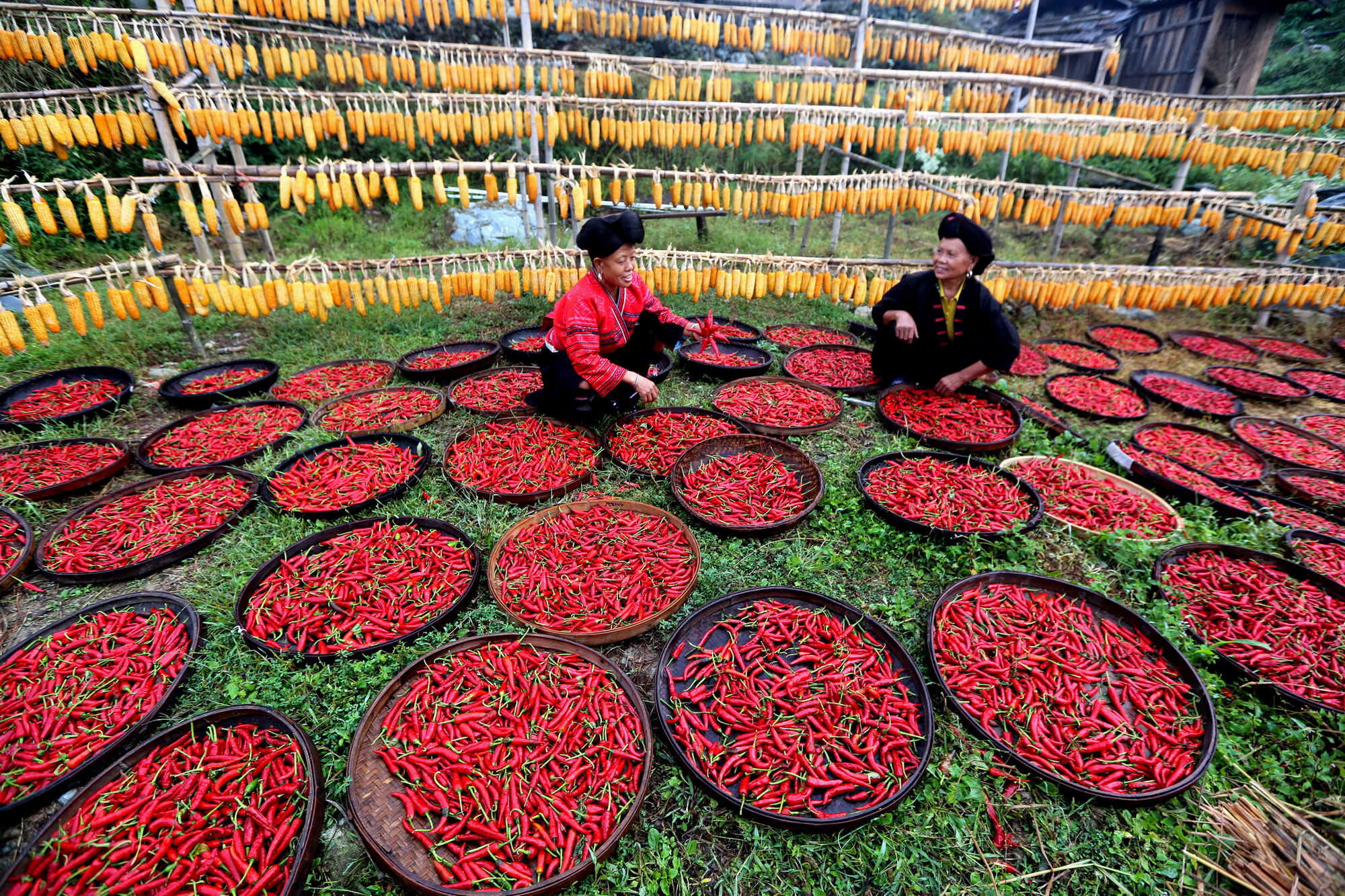
A worker dries chillies at a chilli sauce factory in Shuangfeng County, central China's Hunan, on July 14, 2018. (Xinhua)
"Last year, I grew 0.4 hectares of chilli, and made about 30,000 yuan (4,260 U.S. dollars)," said Chen, a farmer in Xiuling Village of Rucheng County, central China's Hunan Province. By the end of 2018, a total of 780 hectares of chilli has been planted in the county.
CHANGSHA, Aug. 8 (Xinhua) -- A Chinese phrase "chixianghela" depicts a rich lifestyle of eating delicious and spicy food, and that's what Chen Jinxiang's life is all about these days.
Chen used to make ends meet by tending rice paddies deep in the mountains of central China's Hunan Province. But his life took a U-turn after switching to the chilli industry.
"Last year, I grew 0.4 hectares of chilli, and made about 30,000 yuan (4,260 U.S. dollars)," said Chen, a farmer in Xiuling Village of Rucheng County. "This year I have expanded the area to one hectare, and now the chilli is ready for collection."
In the serene village of Xiuling, which means "beautiful mountains" in Chinese, swathes of red chilli and peppers envelop the lush green mountains. The plantation is part of the county government's efforts to help lift locals out of poverty, while creating a "distinctive township based on chilli" in answer to a central government plan.
In 2016, the Chinese government issued a plan to create about 1,000 "distinctive townships" across the country that center on tourism, traditional culture, education, manufacturing and more by 2020.
Over the years, many such townships have mushroomed, including an "acrobatics township," "music township" and "opera township," to name just a few.
So the county of Rucheng, which has a tradition of chilli cultivation and perfect air and soil conditions for growing chilli, decided to turn itself into a special township of chilli.
According to official figures, by the end of 2018, a total of 780 hectares of chilli has been planted in the county. Local officials handed out more than 16 million chilli seedlings, and encouraged 5,461 impoverished families to grow more than 653 hectares of the crops.
To help the growers reap benefits, the local government introduced a major chilli company into the county. The company purchases the chilli from farmers at a bottomline price when the market price is low. Meanwhile, agricultural experts have been designated to help the poor farmers learn the techniques of plantation.
"We also help sell the chilli for the farmers online," a local official said.

Two Villagers prepare harvested chillies in Xiaozhai Village of Longji Township in Guilin, south China's Guangxi Zhuang Autonomous Region, Sept. 23, 2018. (Xinhua/Wang Zichuang)
China aims to eradicate poverty by 2020, the target year to complete the building of a moderately prosperous society in all respects.
The county made the leap in 2018, thanks to the chilli industry.
Last month, Quanshui Township, which administers Xiuling Village, was named one of the "Top Ten Special Agricultural Townships" in Hunan Province.
The chilli has been transformed into different products, including pickled chilli, chopped chilli and chilli sauce, and has been included in local spicy specialties.
In the exhibition hall of Fanhua Food Co., Ltd. in Rucheng, a variety of chilli products are on display.
"We came to invest in the industry in 2018, and our products have taken up almost a half of the chilli market in the county," said Zhu Shuqing, with the company. "We see rosy prospects."
Zhu said that the county is close to coastal provinces like Guangdong, where there is a robust market for chilli, particularly chilli from Hunan Province, which is known in China as a hotbed for chilli production and consumption.
"More people in China are beginning to fall for spicy food, and the chilli industry has huge potential," Zhu said. "The industry truly spiced up people's lives here."



